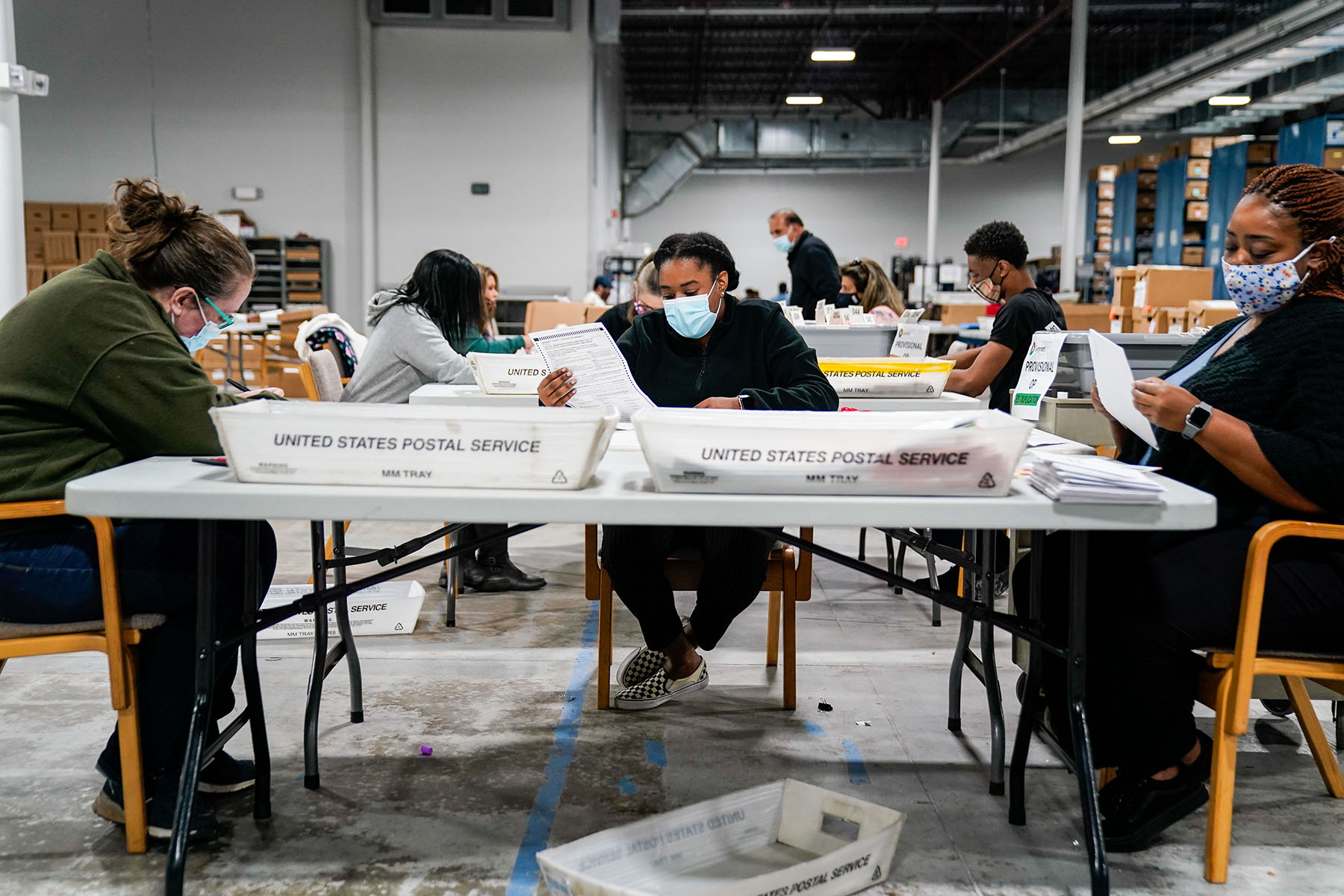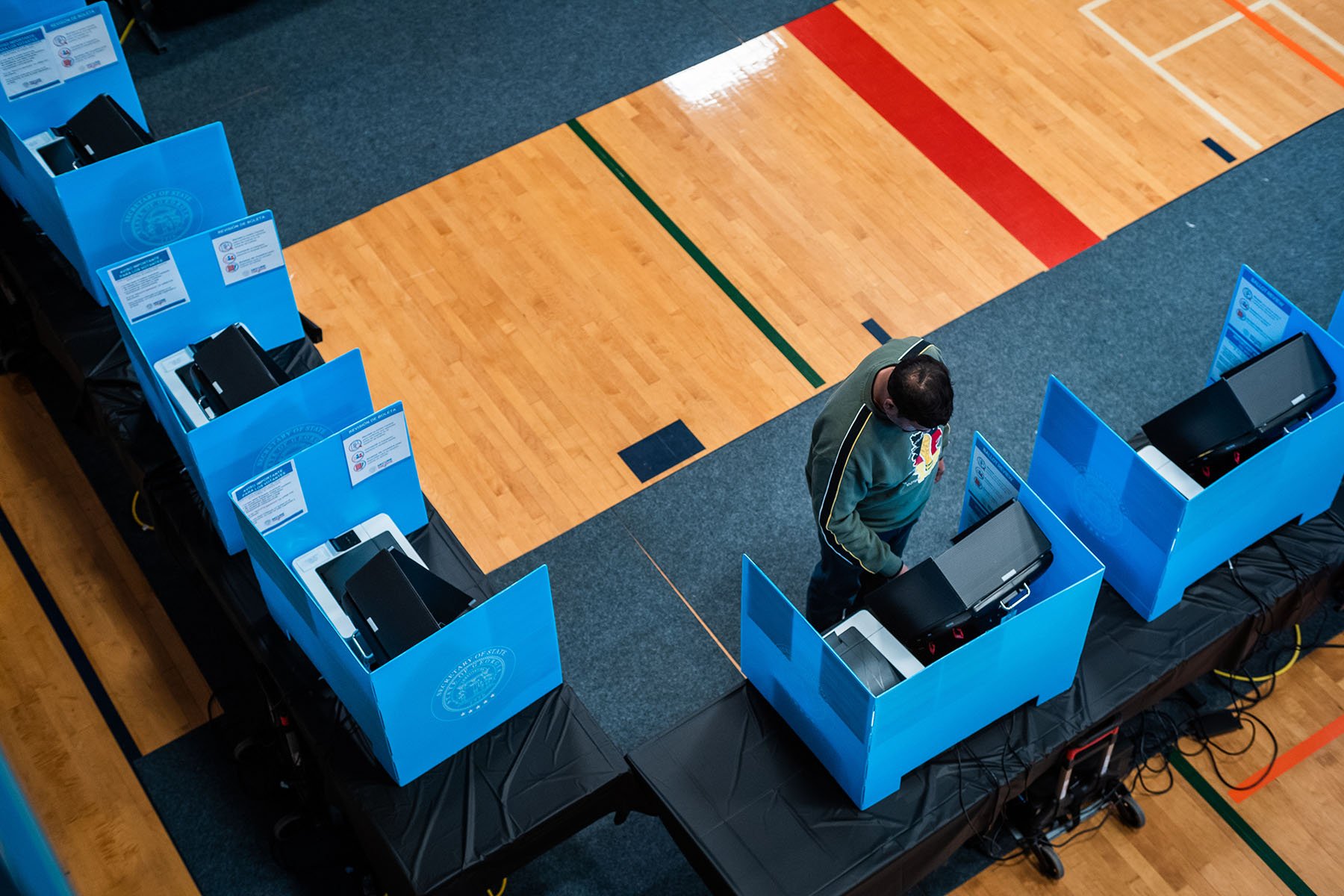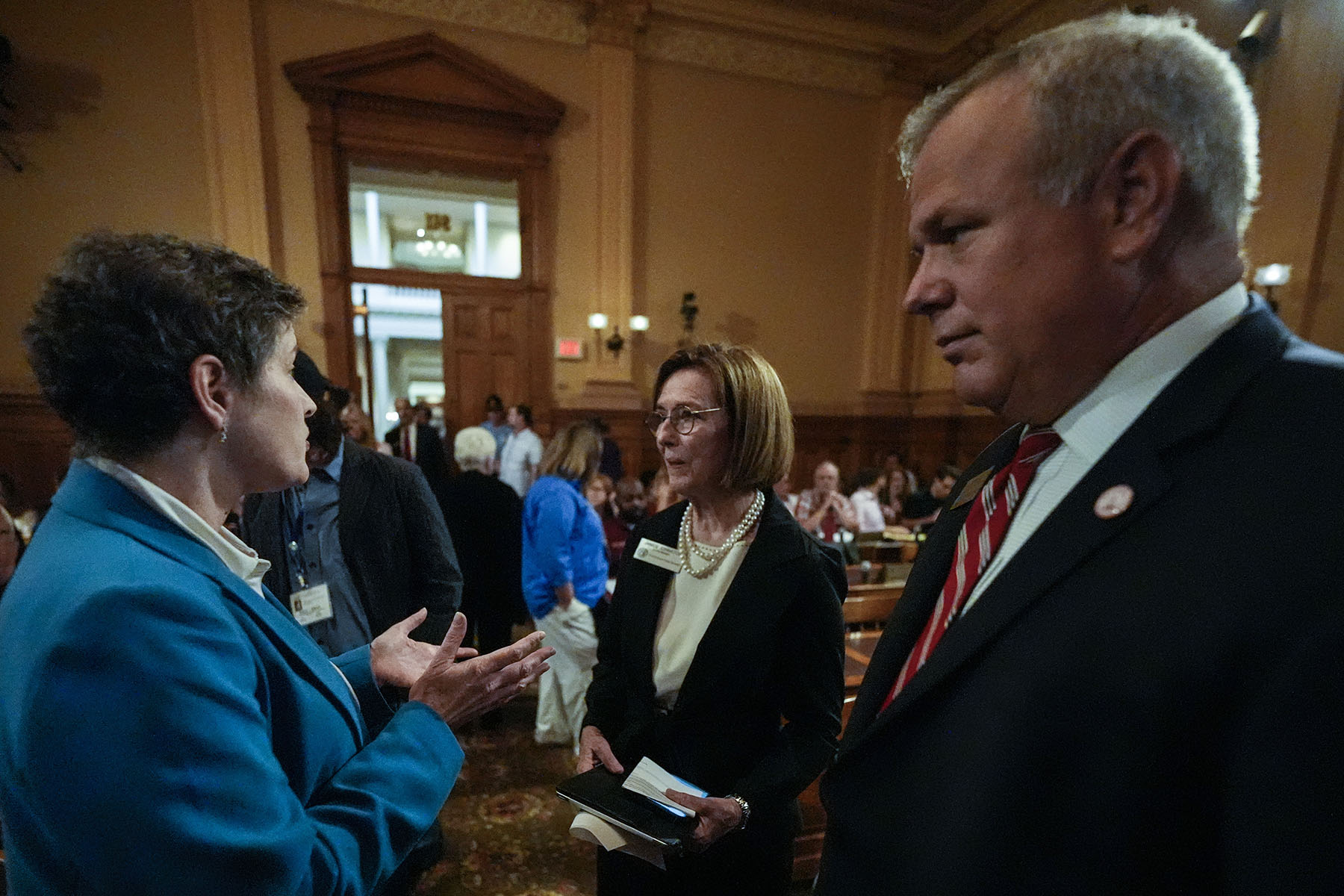The 19th is committed to covering the unfinished business of voting rights. Read more about how we’re approaching that in this pivotal election.
With less than three weeks to go before the presidential election, Lisa McGlaun is trying to do her job — managing the logistics of training poll workers in northeast Georgia — while also tracking any statewide directives that could complicate that work.
McGlaun has had to stay alert. That’s because the State Election Board, a five-member, Republican-majority panel, recently approved a series of rules for election workers to follow, including a requirement that poll workers hand-count ballots after polls close on Election Day. The hand-counting, warned election officials, could upend their administrative plans and delay results in a key battleground state.
“We were already in training when the rule passed,” McGlaun, elections assistant in Athens-Clarke County, said. She worked quickly to make sure poll workers had new instructions. On Tuesday night, a Georgia judge halted the hand counting rule, calling it “too much, too late.”
Voting experts and civic engagement groups say what’s happening in Georgia is part of a larger, years-in-the-making effort to politicize America’s elections — a decentralized system that in the modern era has been run by administrators who have mostly worked in a nonpartisan manner. The goal, they said, is to sow mistrust and create chaos in the critical post-Election Day vote-counting stage.
Georgia may be among the starkest examples, these experts and groups say, but it’s one that previews potential issues elsewhere this election and in the future.
“Georgia is a warning to us all,” said Hannah Fried, co-founder and executive director of All Voting is Local, a nonpartisan organization that works to protect voting access. “It is the clearest sign of how dire things can get for voters — just for having safe and fair elections, like the kind we’re supposed to have.”
The board has drawn national attention, in part because some members have been linked publicly with Donald Trump. The former president, who has refused to commit to accepting the results of the upcoming election, praised three Republican board members by name at one of his rallies in early August.
“They’re on fire, they’re doing a great job,” Trump said, describing the members as “pit bulls fighting for honesty, transparency and victory.”
Around the country, the seeds of mistrust in elections have been in place since 2020, when Trump claimed without proof that widespread voter fraud led to his loss against President Joe Biden. That election was the most secure in history.
During the 2022 midterms, a county clerk in rural Nye County, Nevada, led an effort to hand-count votes after he claimed without evidence that voting machines were less accurate. The Republican secretary of state ordered the clerk to stop, and lawsuits led to a more restricted process that was still riddled with errors.
Since then, more officials elsewhere have considered hand-counting votes despite evidence that such a process is prone to human error and unreliable. The rule in Georgia would have required election workers to hand-count ballots, not votes. That process might have been faster, but some election workers warned it would still be tedious after long hours of work.
Fulton County Superior Court Judge Robert McBurney, in explaining his decision on the hand-counting rule, called the election season “fraught.”
“Memories of Jan. 6 have not faded away, regardless of one’s view of that date’s fame or infamy,” he added, referencing the 2021 insurrection at the U.S. Capitol that escalated into violence and was tied to debunked conspiracy theories about the 2020 election. “Anything that adds uncertainty and disorder to the electoral process disserves the public.”
Zach Manifold is the election supervisor in Gwinnett County, in the metro Atlanta area. He noted that the county, one of the largest in the state, has the financial resources to hire enough staff to ensure election data is recorded efficiently on election night. He also plans to have extra staff available to ensure they can quickly and accurately hand count ballots. Manifold said he is most concerned about smaller, more rural counties where election staffing is more limited.

“I just really don’t see much value, other than you’re making poll officials stay maybe an hour to two hours later at the end of the night, to then start hand-counting the sheets of paper, the ballots,” he said.
In 2023, the Republican-controlled North Carolina legislature passed a bill that would strip the Democratic governor’s power to select members of a key state elections board. Republicans overrode the governor’s veto of the legislation, but it is not in effect after a legal challenge.
This year, local election officials in Nevada and Michigan refused to certify election results during the primary — a process once viewed as mostly ceremonial, but one that some civic engagement groups now worry could be weaponized to slow down final vote-counting processes nationwide.
“It’s a good example of how partisanship is affecting the implementation of elections, which has always been a nonpartisan job,” said Sylvia Albert, director of voting and elections for Common Cause, a national voting rights organization. “Yes, the county board member might be Democrat or Republican, but they were interested in implementing a good election and it did not matter who the voter was and who the voter was voting for, they wanted to help them. I think what we’ve seen now is higher-ranking politicians putting pressure on states to basically politicize these roles.”
These dynamics come as trust in elections has severely eroded since 2020. A survey released this fall by the Associated Press-NORC Center for Public Affairs Research and USAFacts shows Republicans trust the former president more than official election results. (Around 7 in 10 Americans said in the survey that they trust the government certifications of election results at least a “moderate” amount.)
Separately, how disinformation is shared online has created more digital conditions for false narratives to spread about the election. That has been linked to mass challenges to voter registrations.
While scrutiny over the actions of the Georgia State Election Board has culminated this fall, observers say its politicization started nearly four years ago because of a state law.
After the 2020 election, Trump called Georgia Secretary of State Brad Raffensperger to pressure the Republican official to find 11,780 votes to add to the final tally. Raffensperger, who has been outspoken about defending elections in the state, refused. Trump lost the state by just over 12,000 votes.
In 2021, the Georgia Republican-controlled legislature approved legislation that made sweeping election changes, including to the state’s vote-by-mail system and other voting processes. Advocacy groups described the omnibus bill, which included a ban on distributing food and water to voters in line, as restrictive to voting access.
The legislation, which was signed into law by Gov. Brian Kemp, also included a provision removing Raffensperger as chair of the State Election Board while giving its members new authority over county election officials’ activities.
“That allowed for the politicalization, even more politicalization, of the Georgia board,” Albert said of the impact of what became known as SB 202, which Common Cause challenged in court. “That’s kind of how we’ve gotten to this point where the board is attempting to pass rules that are inconsistent with law.”
A separate rule that the State Election Board approved in August gave county election officials more authority to make a “reasonable inquiry” before certifying election results — a move that worried civic engagement groups who said it would give any election deniers who are now on some local boards more discretion to reject ballots.
McBurney’s ruling on hand counting ballots came just one day after he issued a separate ruling instructing local county officials that they must certify election results by the deadline set in state law. The judge added that open court — under the “watchful eye” of a judge and the public — remains the avenue for a losing candidate or aggrieved voter to address suspicions of alleged fraud or abuse.
The ruling, viewed as another way for courts to protect voters’ ballots, came in response to a lawsuit filed by a Fulton County election official who refused to certify the May primary. The Guardian reported in June that the official is a member of an election denial group.
Election administrators and voting rights advocates in Georgia tried to warn the State Election Board that their votes in recent weeks could lead to confusion among voters and cause delays after Election Day.
“I don’t think that the collective actions of the State Election Board over the past many, many weeks are putting us in a good place ahead of this election,” said Natalie Crawford, executive director of Georgia First, a nonprofit organization whose work includes ensuring election access and security. “And what I mean by that is, I think we have election workers across the state, election officials across the state, that have questions about the rules and how to comply with those rules … I think we have voters who are watching, that are feeling more and more frustrated and more and more distrustful of the process here in Georgia.”
Crawford is a self-described “lifelong Republican” and former chairwoman of the Habersham County Board of County Commissioners. Georgia First, along with the anti-Trump The Lincoln Project, filed an amicus brief in support of a legal challenge to the rules passed by the board.
“It’s certainly not fun, by any stretch, when there are such loud voices and forces at work within your party to be the person standing up saying, ‘This is madness. We’ve got to pump the brakes here and stop fueling the skepticism — when these questions have been answered, when these claims have been refuted. Our elections really are safe, accessible and fair in Georgia.”
Board members who have voted for the changes have defended their actions at multiple meetings, framing them as an effort to ensure elections are more secure.
At a hearing this week, an attorney representing the board called criticism over the time required for hand-counting ballots “completely overblown.”
“There’s no conflict with the certification, and there’s no conflict with the election night unofficial results reporting,” said Robert Thomas, according to The Atlanta Journal Constitution.
But statewide Republican officials have weighed in to raise questions about the board’s authority, including the state attorney general’s office.
“Activists seeking to impose last-minute changes in election procedures outside of the legislative process undermine voter confidence and burden election workers,” Raffensperger said in August.
Additional legal challenges to the board’s actions are ongoing, and could still impact what rules are in place in Georgia for Nov. 5. Early voting began Tuesday, with record turnout.
Fried, with All Voting Is Local, said many of the cases involving rogue election officials have had consequences that show their colleagues who respect the rules are prepared to handle these challenges.
“This is a situation where we really do have legal systems in place to deal with it,” she said. “Certification is mandatory. There are serious penalties for elections officials who fail to certify. That is something that I don’t want to lose sight of in this moment.”
In Michigan, state officials including the attorney general, reminded local election officials of their legally required work to certify elections. In Colorado, a former county clerk who was accused of a data breach scheme in 2022 was sentenced this month to nine years in prison for related crimes.

Efforts by election officials to sow mistrust are still more exceptions than the rule, said Albert.
“There are 360 million people in this country. So you might be hearing about some bad actors in some places because they make the news,” she said. “But the majority of election officials in this country just want to run a free and fair election.”
McGlaun said as she goes into Election Day, she is confident in her skills and training as an election administrator.
“We have a really good team in our office, so I feel confident about the process, about what I know I need to do in my job and managing the team that I have and what they know they need to do and their abilities.”
McGlaun’s concerns are related to security. She said her office is working with authorities to have safety procedures that extend beyond what was in place four years ago.
“We will have more people watching us, more people paying attention to what we’re doing — as in people being right over our shoulders as we’re trying to do our work,” she said. “And that makes me a little nervous, because people are a lot bolder now than they even were in 2020.”





